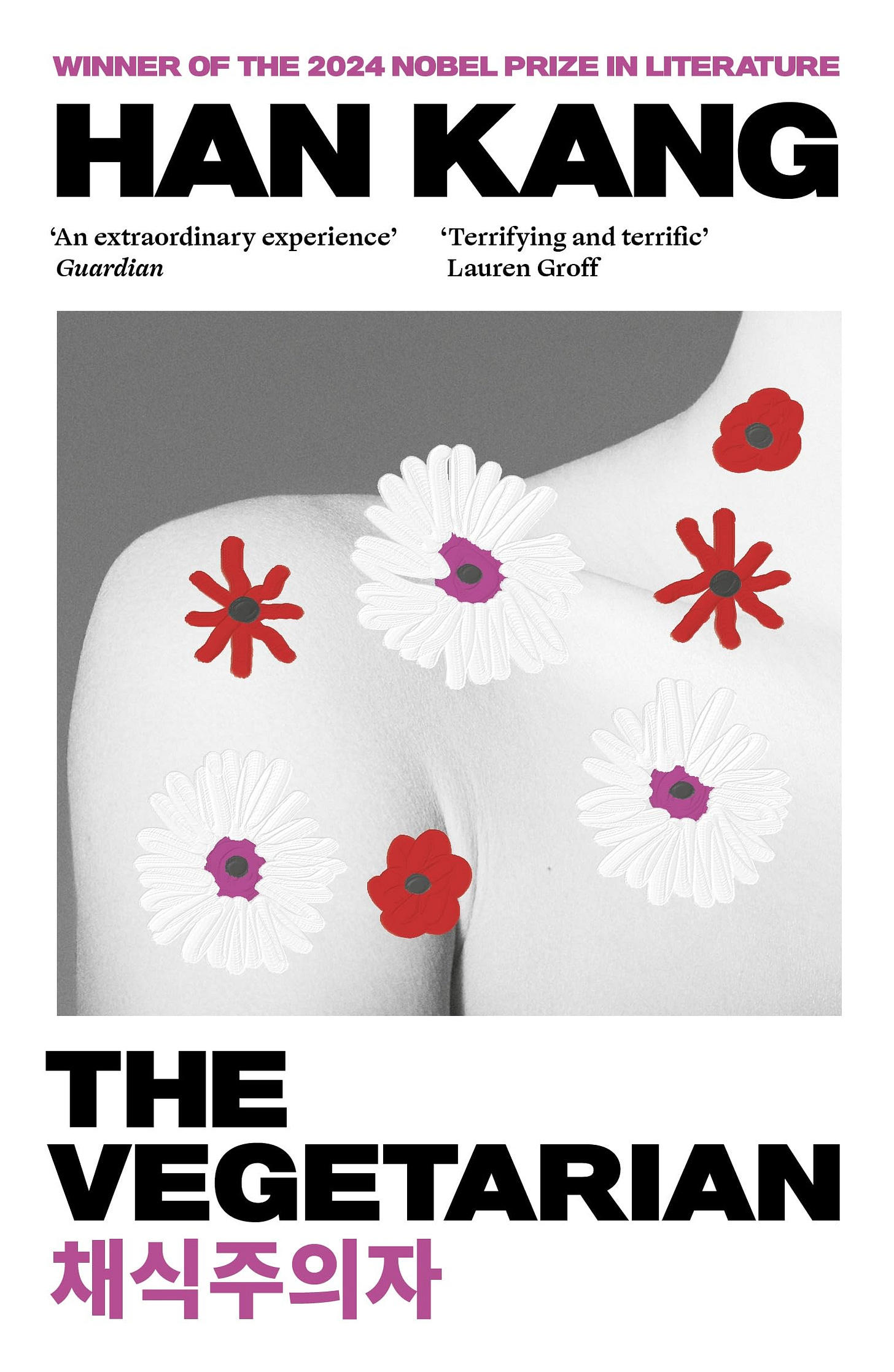Han Kang’s “The Vegetarian”, Conformity, and Beauty Standards
A Review of the 2024 Nobel Prize Winning Novel
After reading this novella, I wasn’t sure if I’d ever be able to collect my thoughts enough to review it properly… so here goes nothing.
Kang’s 2007 novel The Vegetarian follows the devolution of Yeong-Hye, a young woman living in Seoul, South Korea, who decides to give up meat after grotesque and disturbing nightmares. This leads to a chain of events that are increasingly disturbing. The novella is divided into three sections and showcases the perspectives Yeuong-Hye’s husband, brother-in-law, and finally her sister who each try to take control of the devolving situation. The steps taken to shape Yeong-Hye back into a doting wife, attractive sister-in-law, and the sister she once knew all cross Yeong-Hye’s boundaries and violate not just her privacy but also her mind and body.
This book is a compelling read and a fascinating concept.
Caption: the cover of Han Kang’s The Vegetarian.
In the first section, we see her husband react to her decision to become a vegetarian. Her husband views Yeuong-Hye as a completely unremarkable individual. He’s not even sure he likes his wife. The opening passage beautifully encapsulates the brutal and surreal reading experience: “Before my wife turned vegetarian, I’d always thought of her as completely unremarkable in every way. To be frank, the first time I met her I wasn’t even attracted to her. … However, if there wasn’t any special attraction nor did any particular drawbacks present themselves, and therefore there was no reason for the two of us not to get married” (Kang 3). This is but a glimpse at the unashamed and unfiltered writing style of Han Kang and the translation by Deborah Smith. Kang does a brilliant job getting into the minds of those surrounding Yeong-Hye and provides us with a startling and unnerving reading experience.
For most people I know, the idea of becoming vegetarian wouldn’t so much as raise an eyebrow. Sure, maybe some of my close friends and family—cough cough, David—would jokingly lament about the life choice and having to eat vegetables more, but I would suspect that those in my immediate circle would respect the choice and try to accommodate my new lifestyle.
For those surrounding Yeong-Hye, becoming a vegetarian is seen as blasphemy. Traditional Korean food is mostly comprised of meat-centric dishes and her family simply cannot understand why Yeong-Hye would want to give up such delicacies.
The novel isn’t about the ethics of vegetarianism or the potential health benefits of doing so.
It’s about conformity.
By going vegetarian, Yeong-Hye asserts her independence and control over her own life. She no longer is the doting wife who makes three meals a day for her husband that adhere to his dietary preferences. She becomes an object of obsession and fascination for her brother-in-law, who fixates on her Mongolian mark—a bluish grey birthmark that typically goes away by school age but for an unknown reason has not faded on Yeong-Hye—and takes advantage of her unstable state. And for her sister, Yeong-Hye represents a version of herself and makes her question her own sanity.
In these three perspectives, we see a young woman who does not conform to the strict gender roles in South Korea and the impossible beauty standards of thinness and whiteness. The novel is a powerful look at mental illness and the stigma of insanity.
Onto my review…
As an English major, I adored this book. It was a deeply personal glimpse into the world of someone who does not conform into the mould of society and the devolution into mental illness. The prose was beautifully written and the split between perspectives gives you an unwavering glimpse at mental illness. It is unique and unashamed and bold and startling.
And to back that claim up, The Vegetarian won the Nobel Prize in Literature in 2024, along with the Man Booker International Prize in 2016.
However, as just an ordinary bookworm, I can understand how the average rating on Good Reads is 3.63 stars. This book was intense. It is by no means a light and fluffy read. The topics are heavy and Kang does not back away from showing the aspects of mental illness and psychosis that society typically prefers to brush aside.
I found myself unable to read this novella quickly, despite it being only 183 pages (in my edition). I had to put it down frequently and take breaks because it was so so dark.
So for my review of this book, I would give The Vegetarian:
⭐️⭐️⭐️⭐️/ 5
If you are interested in reading this book, please note the content warnings: parental abuse, death of animal, physical abuse, marital rape, forced feeding, attempted suicide, psychosis, body horror, etc.
If you choose to read this book, leave a comment and let me know what you think! If not, let me know what you’re reading right now. I look forward to hearing from you!
Thank you for reading my review of Han Kang’s The Vegetarian. For those of you who read my last post, I’d like to share that I got a job offer and I started last week!





when you said it was only 183 pages I was shocked because of how much there seems to be packed into the book. definitely adding this one to my list this was a great review!!!
That's a great dissection and analysis of a complicared novel and now I feel like i've read it!